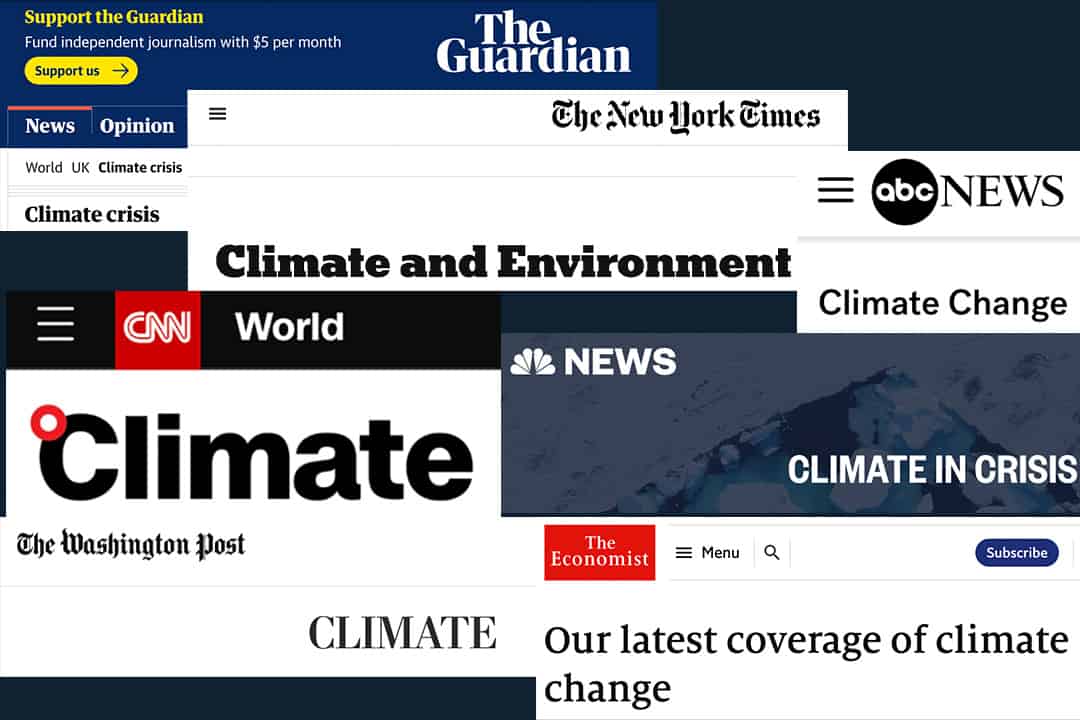As global temperatures surpass themselves every year and rising sea levels increasingly threaten low-lying coastal communities, I believe it is clear that journalists must also change how they report on climate issues.
The language that news organizations choose to communicate our current situation with can directly affect how readers take climate action while it is still not too late. Additionally, while spotlighting climate issues under a ‘beat’ or column is efficient and convenient, it is vital that news organizations also reveal how the flames of climate destruction singe through all sectors of life, and it is hazardous to try and confine it to a corner.
Style guides, handbooks, and vocabulary
In 2019, The Guardian updated its style guide to use terms such as “climate emergency, crisis or breakdown” rather than “climate change,” which connotes a sense of passivity and inevitability. The British left-wing news organization had also declared that it favours ‘global heating’ over ‘global warming.’ On top of the conscious shift in how its journalists are ‘vocabularizing’ climate catastrophes, The Guardian also incorporated the global carbon dioxide level into the paper’s daily weather pages.
The change in The Guardian’s style guide sent ripples across the journalism industry, crossing oceans, and reaching news organizations much closer to home. In response, the CBC clarified that journalists may use “crisis” and “emergency” sometimes, but must exercise caution when doing so. Paul Hambleton, CBC’s director of journalistic standards in 2019, said that “the climate crisis and climate emergency are words that have a whiff of advocacy to them. They sort of imply … something more serious, where climate change and global warming are more neutral terms.”
While it is true that journalists must be careful when tiptoeing the tightrope of news and advocacy, at its very core, journalistic integrity should be about delivering facts.
And the facts show that July 2023 was the hottest month in recorded human history: Canada was engulfed by its worst wildfire season ever, violent torrential rains at deadly rates thrashed Asian countries, and the Mediterranean experienced one of its earliest drought seasons. In early September, UN Secretary-General António Guterres declared that “climate breakdown has begun.” It is undeniable that the environmental issues we currently confront are, in fact, “serious” — and we need to use the appropriate language to convey that.
Bridging cultural divides
Simultaneously, I believe we should also be conscious of how certain rhetorical framing may have adverse effects by exacerbating cultural divides. According to Scientific American, words such as ‘restrict,’ ‘regulate,’ and ‘tax’ are especially unpopular among conservatives when talking about climate solutions. Instead, the scientific magazine proposes that people may be more responsive when climate-related solutions are described with words and phrases such as “innovation,” “market-based” and “competing in the global clean energy race.”
For example, the US’ Inflation Reduction Act in 2022 is the largest climate investment in American history that also aims to curb inflation and create jobs. Originally named “The Build Back Better Act” but later amended on paper to its more economically-rooted current name, the language used to promote this bill appears to us to appease both sides of the climate ‘debate,’ swinging votes from moderate senators who, eventually, signed the bill into law. It is necessary that we play our cards right to show how all sides of the climate ‘debate’ can benefit through cooperation.
Moreover, news organizations need to actively work to mitigate crisis fatigue, especially if we want to use stronger language to describe climate emergencies. When news readers are constantly exposed to disaster stories, they can develop a sense of fatalism which can stagnate any hope or motivation to rejuvenate our planet. According to the UN’s Climate Action page, a good way to prevent disillusionment is to convey a message that also focuses on solutions.
The climate permeates all sectors of news
News organizations such as the CBC have established a climate ‘beat’ for their coverage. Although this is a step in the right direction, I believe climate news cannot be simply confined to a solitary section of a newspaper — it permeates all.
To name a few: the climate crisis has affected how conflicting American and Chinese interests in lithium mining are devastating the African terrain, how unprecedented weather patterns affect what foods end up on our plates, and how the real estate market will change alongside floods and hurricanes. These topics also concern international news, public health, the economy, and its environmental implications. As borders are only helpful to a certain extent, news organizations should strive to incorporate a climate perspective in their pieces as much as possible.
Meanwhile, climate news — at least news from settler-colonial states — must also work to better incorporate Indigenous perspectives. We also need more Indigenous reporters covering climate stories in mainstream outlets. In Canada, there is already a push to ensure that Indigenous peoples are involved in data collection processes, and given control over their data and how it is used. After all, Indigenous practices of cultural burns have proven to be majorly helpful in rebalancing ecosystems across Canada.
Climate news has garnered a dramatic increase in airtime in recent years. While we suffer the extreme changes in our lives due to environmental deterioration, organizations within the journalism industry must also figure out how they should navigate their ships through the highly politicized storm of climate news. And, importantly, they need to figure it out before the unforgiving waves of the effects of the climate crisis come crashing over us.
Charmaine Yu is a third-year student at Trinity College studying political science and English. She is an editor-in-chief of The Trinity Review and the What’s New In News columnist for The Varsity’s comment section.



No comments to display.